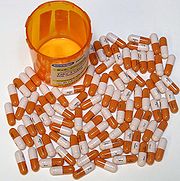
Pharmaceutical lobby
Encyclopedia

Biomedicine
Biomedicine is a branch of medical science that applies biological and other natural-science principles to clinical practice,. Biomedicine, i.e. medical research, involves the study of physiological processes with methods from biology, chemistry and physics. Approaches range from understanding...
companies in the United States
United States
The United States of America is a federal constitutional republic comprising fifty states and a federal district...
who seek to influence federal government policy.
Political influence in the U.S.
The top twenty pharmaceutical companies and their two trade groups, Pharmaceutical Research and Manufacturers of AmericaPharmaceutical Research and Manufacturers of America
Pharmaceutical Research and Manufacturers of America , founded in 1958, is a trade group representing the pharmaceutical research and biopharmaceutical companies in the United States. PhRMA's stated mission is advocacy for public policies that encourage the discovery of new medicines for patients...
(PhRMA) and Biotechnology Industry Organization
Biotechnology Industry Organization
Biotechnology Industry Organization is an industry lobby group founded 1993 in Washington, D.C. Carl B. Feldbaum was the president until he retired in 2004, and was succeeded by James C. Greenwood.-External links:* *...
, lobbied on at least 1,600 pieces of legislation between 1998 and 2004. According to the non-partisan Center for Responsive Politics
Center for Responsive Politics
The Center for Responsive Politics is a non-profit, nonpartisan research group based in Washington, D.C. that tracks money in politics and the effect of money and lobbying activity on elections and public policy and maintains a public online database of its information.Their database...
, pharmaceutical companies spent $900 million on lobbying between 1998 and 2005, more than any other industry. During the same period, they donated $89.9 million to federal candidates and political parties, giving approximately three times as much to Republicans
Republican Party (United States)
The Republican Party is one of the two major contemporary political parties in the United States, along with the Democratic Party. Founded by anti-slavery expansion activists in 1854, it is often called the GOP . The party's platform generally reflects American conservatism in the U.S...
as to Democrats
Democratic Party (United States)
The Democratic Party is one of two major contemporary political parties in the United States, along with the Republican Party. The party's socially liberal and progressive platform is largely considered center-left in the U.S. political spectrum. The party has the lengthiest record of continuous...
. According to the Center for Public Integrity
Center for Public Integrity
The Center for Public Integrity is a nonprofit organization dedicated to producing original, responsible investigative journalism on issues of public concern. The Center is non-partisan and non-advocacy and committed to transparent and comprehensive reporting both in the United States and around...
, from January 2005 through June 2006 alone, the pharmaceutical industry spent approximately $182 million on Federal lobbying. The industry has 1,274 registered lobbyists in Washington D.C.
Prescription drug costs in the U.S.
Critics of the pharmaceutical lobby argue that the drug industry's influence allows it to promote legislation friendly to drug manufacturers at the expense of patients. The lobby's influence in securing the passage of the Medicare Prescription Drug Improvement and Modernization Act of 2003 was considered a major and controversial victory for the industry, as it prevents the government from negotiating prices with drug companies who provide those prescription drugs covered by Medicare. As a result, 61 percent of Medicare spending on prescription drugs is direct profit for pharmaceutical companies.The high price of U.S. prescription drugs has been a source of ongoing controversy. Corporations claim the high costs are the result of pricey research and development programs, while critics point out, in addition to the industry's profits, the high proportion of pharmaceutical budgets devoted to marketing and lobbying. According to Marcia Angell, the former head of the New England Journal of Medicine, "The United States is the only advanced country that permits the pharmaceutical industry to charge exactly what the market will bear."
Influence over doctors in the U.S.
The pharmaceutical industry's sponsorship of clinical research has come under increased scrutiny in recent years, as authors of publications favorable to the industry often receive compensation from major drug companies, thereby raising doubts about their research's objectivity. Additionally, advocacy groups within and beyond the medical profession have asserted that direct advertising to physicians, free samples, and research stipends encourage doctors to over-prescribe medications.External links
- Pharmaceutical lobbying totals at Opensecrets
- Corporations and Health Watch
- PhRMA's home page
- PBS series on the pharmaceutical industry
- Big Bucks, Big Pharma, Amy GoodmanAmy GoodmanAmy Goodman is an American progressive broadcast journalist, syndicated columnist, investigative reporter and author. Goodman is the host of Democracy Now!, an independent global news program broadcast daily on radio, television and the internet.-Early life:Goodman was born in Bay Shore, New York...
, 68 minutes

